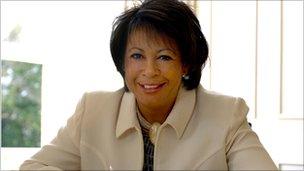Boardroom diversity is a must for firms, executives say
- Published
A study on boardroom gender equality in the UK has been published.
The report, by Lord Davies, does not recommend quotas or legislation, but sets out less rigid targets to get more women into the higher ranks of the corporate world.
Here, three businesswomen set out what they think needs to improve to begin to redress the balance.
Moira Benigson, CEO of The MBS Group, executive search consultancy

I'm always amazed to meet women leaders who, despite having a successful career, are not able to play the political game as well as men. They tend to believe that just doing a good job should be enough.
In 25 years as a headhunter, I have seen women fail to manage their progression, and therefore their promotion, by not being as pro-active within their career, as men. When they see their ambitions fail to materialise they may develop a "fear of flying" and choose to stay in roles that are well below their capability rather than going for the challenge of being at the top.
I believe that corporate rules need to change. Regardless of the talk about equality, many boards continue to stick to old hiring patterns and prefer to hire people that they are familiar with - they hire in their own image.
This perpetuates a lack of diversity that could, ultimately, damage their business. It is this attitude which needs changing, and if it doesn't then boards could be faced with enforced regulations such as the quota system. This has happened in South Africa, where legislation has been effective in ensuring that there is a quota of black directors on company boards.
Business will only reflect and serve the needs of the society we live in if we push chairmen to change their hiring criteria and hire more women onto their boards. If we don't steer the thinking of board members to realise the potential of such hires, then, indeed pressure must be applied and legislation will have to be considered.
I have also seen many talented women leaders opt out of corporate life and take the entrepreneurial route to great success. For these women, running their own business means that that they can achieve a better balance between work and family, without the restriction of corporate rules.
There is a lot of talk about the glass ceiling, but women can break through the barriers and go all the way to the top. As leadership expert Rebecca Shambaugh puts it: "It might not always be the glass ceiling, but the sticky floor" that is partly to blame.
Liz Field, CEO of the Financial Skills Partnership
Companies operating in the financial services sector have a particularly poor reputation when it comes to females in boardrooms.

We know there are fewer women than men at senior levels across the industry and the image of our sector is that it is male dominated.
The reality might be different in some cases and we know that diversity programmes, women's networks and flexible working have been widely introduced in the industry. But perception is all and it could be damaging our ability to attract and retain key talent that we need for growth and competitiveness.
When it comes to looking at top jobs, women are far more likely to rule out jobs even if they have little or no experience in only some aspects. That could be a lack of confidence or realism, but generally men will go for the top job regardless of whether they have all the relevant experience.
I myself have looked at jobs in the past and thought I could do it standing on my head, but have not submitted the application form because I thought the odds would be stacked against me, because I did not tick all the right boxes.
There has been a lot of talk about gender diversity over the past few months. Even the EU Justice Commissioner Viviane Reding said in September that she would consider calling for quotas requiring businesses to hire more women and wants to see 30% women directors on boards by 2015 and 40% by 2020.
A key argument for greater board diversity is that it increases a firm's competitive advantage relative to those with less diversity.
Given that women now have a major influence on purchase decisions it makes good business sense to increase diversity, particularly in those functions that are the profit-making parts of the business. The Financial Skills Partnership will be driving up employer ambition in this respect.
There is a lot to do and there are some fundamentals that do need to be addressed. Employers should look at diversity to improve their businesses and not because they have been told to.
Carmen Watson, Managing Director of Pertemps Recruitment Partnership
When I had my daughter, Rebecca, my company offered a five-year window where they kept my job open, and it was a huge confidence booster. The gesture sent out a very positive and morale-boosting message to all the female employees inside and outside the business.

There should be more situations that mirror mine. That was many years ago and today I feel companies still have a long way to go. My daughter is now 21 and I wonder if she will have to face the same challenges I faced in my ascent up the corporate ladder.
Companies need to be more flexible in how they recruit, develop and manage their top talent. If they create the right infrastructure they can then develop and hold on to their star performers.
I don't feel that boardroom quotas are the solution. Quotas are not inherently good because both men and women need to feel that the women have earned their way to the top. It is counterproductive if women are put on boards just to fill quotas, as the impact they will have on major company decisions to help shape company policy will be diminished.
That said, businesses should be held accountable for setting targets which are achievable and realistic for the marketplace in which they are operating. They then need to create frameworks and infrastructures which will help nurture and develop top female talent.
Although women make up half of the population and more than half of university graduates, they remain woefully under-represented at board level. What is needed is cultural change, which fosters the leadership development of women in middle management, not quotas, ratios or tokenism.
Flexibility allows firms to set targets that reflect the realities of their marketplace, and is more effective.
The real solution lies within companies, shareholders, the government and the recruitment profession working together to deliver the changes that will help women to achieve these board-level positions.
Businesses which have diverse boardrooms are more empowered to serve diverse markets across a wide variety of sectors. Boardroom diversity is no longer an option but a critical part of the growth strategy of many businesses in order to remain competitive both in the UK and abroad.
Amanda Jobbins, Cisco vice president of European technology and corporate marketing
The issue of quotas to compel UK business to increase the number of female directors on their boards in line with similar initiatives in Norway, France and Spain can only have a positive effect in my view.

Over the last 10 years in the UK, Directorships held by women in the FTSE 100 have increased from 5.8% to 12.5% according to a study by Cranfield, however, at this rate the Equality and Human Rights Commission estimates that it will take 73 years before equal numbers of women and men are in the FTSE 100 Boardrooms.
Traditionally, many women in senior positions have opposed quotas on the grounds that we should achieve seniority on the basis of our own merits, and while I wholly agree all roles should be appointed on merit, it's the definition of merit that needs changing.
At Cisco in the UK we already have 40% of our UK board comprised of females and we are driving many diversity initiatives across the company.
A key issue is that the behavioral and mind set change required.
To change business recruiting and promotional trajectories to ensure companies have women at senior levels in the company, is simply going to take too long and there are many reasons, not least the ethical reason, to speed up that progress. Quotas will achieve that acceleration."
Helena Morrissey, Chief Executive of Newton Investment Management and Founder of The 30% Club
People sometimes assume that I'm in favour of quotas to increase the proportion of women in the boardroom. They're wrong. I strongly believe that quotas are demeaning to women, make no business sense and can backfire.

As long as there are quotas, people will always be able to question whether a woman was appointed on merit or just because she is female. I really wouldn't want to be appointed to a board under those circumstances. It is much better to achieve a better gender balance on boards through real commitment and voluntary actions.
It is true that the pace of change in recent years has been glacial and I am pleased that the Davies report will require companies to indicate what steps they are taking to achieve real progress towards achieving a better gender balance at senior levels of companies over the next few years.
The 30% Club aims to catalyse achieve real underlying change from the top. Its members are company chairmen who have expressed their commitment both to the goal of 30% female representation on their own boards over the next five years and are doing something about it.
Since the Club launched just last November, two of our founding Chairmen, Sir Roger Carr of Centrica and Sir Win Bischoff of Lloyds Banking Group have both appointed additional women to their boards. They are doing this because they believe its good for business, not as a sop to women or because they have been forced to through legislation.
The more women join boards, the more they can demonstrate that they can add real value to an organization - not only in terms of bringing a new perspective to the table, but also in terms of boosting a company's bottom line.
Research by Mckinseys shows that on key financial metrics, including return on equity, companies around the world with 30% or more women on their board perform significantly better. Intuitively, too, having a broader range of experiences, characters and styles on a board means less risk of 'group think' and greater likelihood that critical decisions are robustly challenged.
We know we can't solve the problem of female under-representation overnight, but we are confident that we can make a significant difference to the make-up of boardrooms through concerted voluntary action.
The opinions expressed are those of the authors and are not held by the BBC unless specifically stated.
- Published24 February 2011